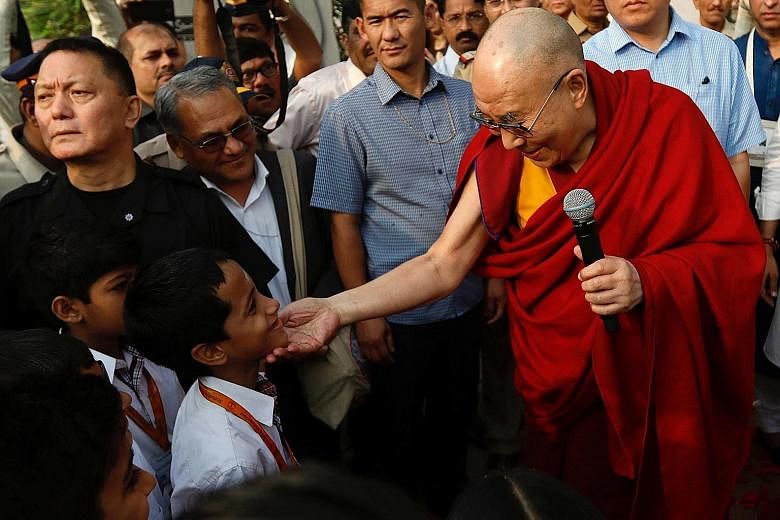MCLEOD GANJ (India) • An original song of thanks to India had been rehearsed, and a stadium in New Delhi booked for a celebratory rally - all a gesture of gratitude from the Dalai Lama and his followers for India's role in sheltering them after a Chinese crackdown on rebellious Tibetans 60 years ago.
Instead, the "Thank You India" celebrations this weekend set off apprehension in New Delhi and embarrassment among Tibetans.
A directive from India's foreign minister urged officials to discard their invitations, and it was blunt in saying the timing of the events coincided with a "sensitive time" for New Delhi's relations with Beijing. A series of high-level meetings between Indian and Chinese officials are being billed in India as an attempt to smooth over an increasingly tense relationship.
Invitations to officials were withdrawn, and the event was moved from a New Delhi stadium to the secluded northern town of McLeod Ganj, home to the Dalai Lama's temple and the seat of the Tibetan government in exile. A scheduled interfaith prayer in the Indian capital was cancelled rather than moved, given the lack of other religious representatives in McLeod Ganj.
"In Delhi, we approached many dignitaries and invited them," said Mr Sonam Dagpo, a spokesman for Tibet's government in exile and the chief organiser for the planned events. "But the foreign minister's notice says very clearly that Indian officials shouldn't attend. So why continue? It's futile."
The cancelled events underline India's struggle to both court and counterbalance China, an increasingly difficult feat given Beijing's recent willingness to exhibit its military growth.
India has continued to host the Dalai Lama and his fellow Tibetan Buddhist exiles even though China condemns them as dangerous separatists. But the Indian government has also sought at times to rein in the religious leader at crucial moments in the relationship with China, and this is certainly one of them. India is trying to encourage trade ties and Chinese investments while playing catch-up to modernise its military, worried about China's rapidly expanding forces and its growing influence all around India in South Asia.
"Giving in to China on the Tibetan community in exile is largely symbolic," said Dr Jonathan Holslag, professor of international politics at the Free University of Brussels. "But it does mark India's weakening compared to China. China is rapidly modernising its military presence, and India cannot follow."
When China increased its annual defence budget in March to US$175 billion (S$230 billion), it dwarfed the US$45 billion India had announced just weeks before.
The coming talks with China cited by the Indian foreign minister's directive will be the highest-level meetings since the two countries engaged in a military standoff last year, after China expanded an unpaved road in a contested sliver of territory in the Himalayas.
The dispute was resolved in August, but Indian and Chinese troops threw rocks and chest bumped each other in a clash that some fear could flare up again. Over the next few months, India's defence and foreign ministers will meet their Chinese counterparts before a meeting between Prime Minister Narendra Modi and President Xi Jinping in June. The main topics on the agenda are trade and border disputes, according to Western diplomats in New Delhi.
An Indian Ministry of External Affairs spokesman said New Delhi has not changed its stance on the Dalai Lama, adding: "His Holiness is accorded all freedom to carry out his religious activities in India."
But generally, analysts say, it is clear that India has been more cautious with China about the Dalai Lama and other issues.
"This is not appeasement. China's relative bargaining positions have improved across the board," said Mr C. Raja Mohan, director of Carnegie India, a branch of the Carnegie Endowment for International Peace. "The main objective is to manage the relationship while avoiding a confrontation but leaving space for India to progress, catch up and increase its bargaining position."
NYTIMES

